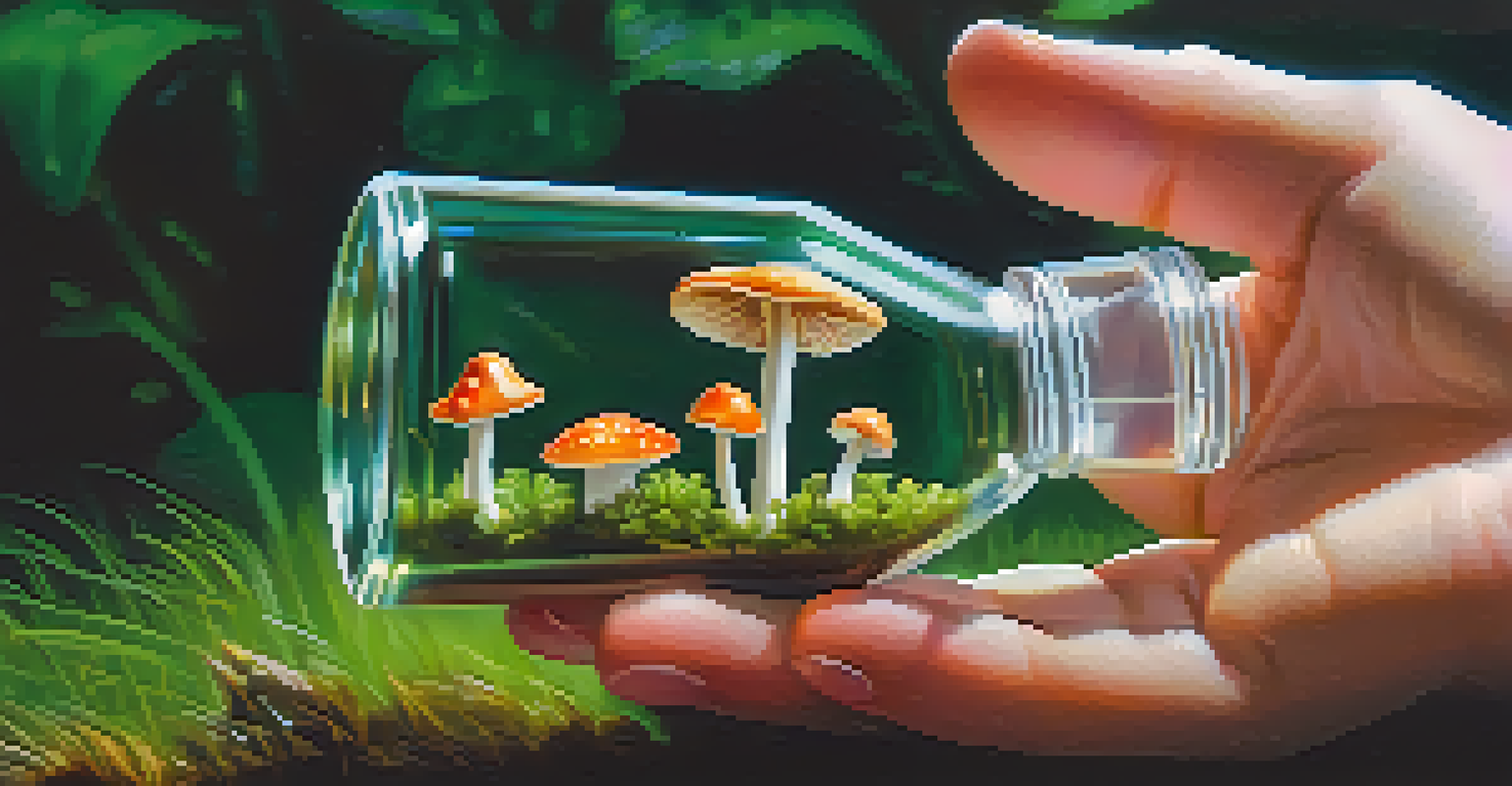The Connection Between Hallucinogens and Emotional Awareness

Understanding Hallucinogens and Their Effects
Hallucinogens are substances that alter perception, mood, and cognitive processes. Common examples include psychedelics like LSD, psilocybin (magic mushrooms), and DMT. These substances can create vivid sensory experiences and profound changes in thought patterns, often leading to introspection.
Psychedelics can help us confront our inner demons and foster emotional growth.
People often report experiencing a heightened sense of self-awareness and emotional clarity during hallucinogenic experiences. This can help individuals confront and process emotions that they might otherwise avoid. In many cases, these experiences facilitate a deeper understanding of one’s feelings and relationships.
While the effects of hallucinogens can vary widely from person to person, there’s a growing interest in their potential therapeutic benefits. Researchers are investigating how these substances might aid in treating mental health issues like depression, anxiety, and PTSD, particularly by fostering emotional awareness.
The Role of Emotional Awareness in Mental Health
Emotional awareness refers to the ability to recognize, understand, and express one's emotions. This skill is crucial for maintaining mental health and fostering meaningful relationships. When individuals are aware of their feelings, they can better manage stress and communicate effectively with others.

Many mental health conditions stem from a lack of emotional awareness. For instance, someone suffering from depression may struggle to identify and articulate their feelings, leading to a cycle of negativity and isolation. Enhancing emotional awareness can empower individuals to break these cycles and seek help when needed.
Hallucinogens Enhance Emotional Awareness
Psychedelics can foster emotional clarity and self-awareness, aiding individuals in confronting suppressed emotions.
By improving emotional awareness, people can also enhance their resilience. This means they become better equipped to handle life’s challenges, as they can more easily identify their emotional responses and adapt accordingly. Hallucinogens may play a role in this process by providing unique insights into one’s emotional landscape.
Research on Hallucinogens and Emotional Processing
Recent studies have begun to explore the connection between hallucinogens and emotional processing. Research indicates that psychedelics can lead to increased emotional openness and reduced defensiveness, which can be particularly beneficial in therapeutic settings. This shift in mindset allows individuals to confront suppressed emotions more readily.
The therapeutic potential of psychedelics lies in their ability to enhance emotional awareness and facilitate healing.
One notable study found that participants who experienced guided psychedelic sessions reported significant increases in emotional awareness and well-being. They described feeling more connected to their emotions and more capable of expressing them. This suggests that the self-exploratory nature of hallucinogens may facilitate deeper emotional insights.
These findings are prompting mental health professionals to consider how hallucinogens can be integrated into therapeutic practices. The potential for these substances to enhance emotional processing could lead to more effective treatments for various mental health disorders, paving the way for innovative approaches in therapy.
Personal Experiences with Hallucinogens
Many individuals share personal stories about their experiences with hallucinogens and how these experiences have impacted their emotional awareness. For some, a single trip can feel like a transformative journey, allowing them to confront their fears and insecurities. These narratives often highlight newfound clarity and a deeper understanding of their emotional states.
Anecdotes abound of people who, during hallucinogenic experiences, have gained insights into their relationships and past traumas. This can lead to healing, as they work through unresolved feelings in a safe and controlled environment. Such stories underscore the potential of hallucinogens to act as catalysts for emotional growth.
Therapeutic Potential of Psychedelics
Research shows that hallucinogens may provide lasting improvements in emotional well-being, making them valuable tools in mental health treatment.
However, it’s essential to approach these experiences with caution. While many report positive outcomes, others may encounter challenging emotions that can be overwhelming. It’s crucial to have a supportive and safe setting when exploring emotional awareness through hallucinogens.
The Therapeutic Potential of Hallucinogens
The therapeutic potential of hallucinogens has garnered significant attention in recent years. Researchers are investigating how these substances can be used to treat various mental health conditions, particularly where emotional awareness plays a critical role. This includes conditions like depression, anxiety, and addiction, where emotional regulation is often disrupted.
Clinical trials are showing promising results, indicating that psychedelics can lead to lasting improvements in emotional well-being. Participants in these studies often report enhanced emotional awareness and a greater ability to understand their feelings post-treatment. This suggests that hallucinogens could serve as valuable tools in the therapeutic arsenal.
As more research emerges, the conversation surrounding hallucinogens and therapy continues to evolve. Mental health professionals are increasingly recognizing the importance of emotional awareness in treatment, and hallucinogens may offer a unique pathway to achieving this awareness.
Cautions and Considerations
While there’s excitement about the potential benefits of hallucinogens, it’s essential to approach them with caution. Not everyone will have a positive experience, and for some, hallucinogens can exacerbate existing mental health issues. It’s crucial to consider individual circumstances and mental health history before exploring these substances.
Additionally, the setting in which hallucinogens are used plays a significant role in the overall experience. A safe, supportive environment can enhance the positive effects, while a chaotic or unprepared setting can lead to distressing experiences. This underscores the importance of preparation and support when venturing into this territory.
Caution is Essential with Hallucinogens
While hallucinogens offer potential benefits, it is crucial to approach their use with care and in supportive environments to mitigate risks.
Ultimately, anyone considering the use of hallucinogens for emotional awareness should seek guidance from qualified professionals. Engaging in open conversations about these substances and their effects can help demystify them and promote safer exploration.
The Future of Hallucinogens and Emotional Awareness
As research continues to unfold, the future of hallucinogens in the realm of emotional awareness looks promising. With a growing body of evidence supporting their therapeutic benefits, we might see more integration of these substances into mental health treatments. This could lead to innovative approaches that prioritize emotional healing.
The rising acceptance of psychedelics in both scientific and public spheres suggests a shift in how we view mental health treatment. As stigma decreases, more individuals may seek out these experiences for personal growth and emotional understanding. This cultural shift could pave the way for broader discussions about emotional awareness.

Ultimately, the connection between hallucinogens and emotional awareness represents a fascinating area of exploration. Continued research, open dialogue, and responsible use will be crucial in unlocking the full potential of these substances for emotional healing and awareness.